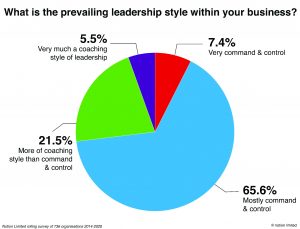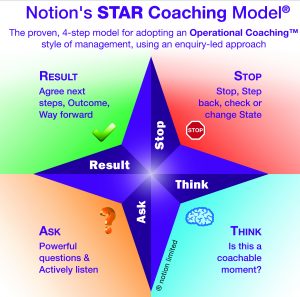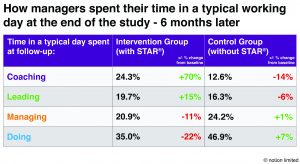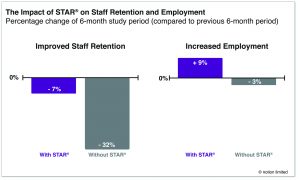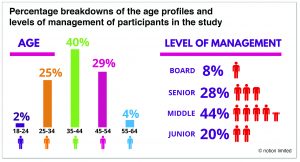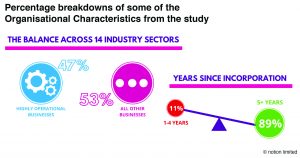An independent evaluation of Notion’s online programme, developing leaders’ coaching skills, revealed improvements in engagement, performance and productivity, transforming management behaviour and capability at scale over just six months. Laura Ashley-Timms and Dominic Ashley-Timms report
Management performance improvement consultancy, Notion, has worked with thousands of leaders and managers on every continent and in all sectors to promote an enquiry-based leadership style through its STAR® model.
Its programmes have garnered the interest of the UK government, which funded academic research by the London School of Economics (LSE) to explore how adopting Operational Coaching™ as a leadership style can drive productivity in organisations.
Despite the trial continuing during the unprecedented events of the last 18 months, the results (independently evaluated by the LSE) have been extremely positive. This article explores the background to the launch of the programme and the results of the evaluation. The model will be explored in more detail in a subsequent issue.
Let’s start with a question:
If you could transform the way that all your or your client’s organisation’s managers engaged with their teams in the next six months, what benefits would that generate for the organisation?
What changes might you begin to see in your or your client’s organisation’s engagement, retention, productivity or performance levels? How might collaboration, innovation, agile working and the management of hybrid teams be improved? What impact might there be on the drive for greater sales, improved team wellbeing or reduced levels of overwhelm and stress?
The concept of transformation at this scale and speed may sound too good to be true. Yet the results from a groundbreaking, government-sponsored research programme conducted in 62 organisations across 14 sectors, proves that all of this is indeed possible.
Background
In 2019, the UK’s Department for Business, Energy & Industrial Strategy (BEIS) published its Business Productivity Review which highlighted the widening gap between UK productivity levels and those of the G7 (an organisation of the world’s seven largest economies), with UK firms comparing “particularly unfavourably internationally on people management… the factor most correlated to Productivity.” 1
BEIS noted that more productive companies were those with higher levels of:
- Employee engagement
- Job satisfaction
- More skilled managers
- And who provided training to improve the skills of those managers
Consequently, BEIS identified Leadership and Management as one of three areas of focus for improvement.
In 2019, the Confederation of British Industry (CBI) report, Great Job, highlighted the untapped potential within the UK’s workforce2. The CBI identified seven habits that would build on and improve management capability3, which included:
- Putting people objectives on a par with commercial objectives
- Managers providing regular appreciative and strengths-based feedback
- Coaching: ‘on-the-job’ development and support
The market for coaching also continues to grow globally (estimated in 2019 at $2.8bn; 6% annual growth)4. Yet there’s still a widespread lack of leaders with strong coaching skills, it seems. An employee survey by the Chartered Institute of Personnel and Development (CIPD; which ranked the skills of people’s line managers), put “coaches me on the job” at the bottom of a list of 15 management competencies5.
And a rolling survey of 736 HR leaders conducted by Notion over the last decade, showed that in 2020 only 5.5% reported that their organisation’s leadership demonstrated a strong coaching style6. Some 73.1% still indicated that their leaders and managers mostly or exclusively use a command & control style of management (Figure 1).
Earlier research conducted by Notion concluded that the benefits of coaching weren’t reaching the bulk of employees in organisations so “in spite of a high awareness of coaching and its value, it had yet to have the transformational impact it is capable of in most organisations”.
Behavioural coaching model
In 2010, based on its work with large groups of managers and leaders, Notion launched a behavioural coaching model, Notion’s STAR Coaching Model® (Ashley-Timms & Ashley-Timms, 2010; see Figure 2). Managers learn to use the STAR® model to help them adopt an Operational Coaching™ style of management that favours an enquiry-led approach.
Instead of focusing on the client and their needs, the model helps leaders and managers to develop new habits to get them to quickly change state and have ‘in-the-moment’ coaching conversations every day. STAR® is designed to interrupt a manager’s typical response, even when they’re under pressure, so they’re able to ask more powerful questions more frequently.
The impact of embedding the STAR® model to support wider adoption of an Operational Coaching™ style of management was measured by Notion between 2011 and 2019 across different corporate and academic organisations and was consistently found to improve levels of engagement, performance and productivity. As a result, clients requested that Notion build a scalable training solution that would generate the same changes in habitual behaviour (adopting an Operational Coaching™ approach), but for large numbers, at scale. The fully virtual blended management development programme, STAR® Manager, launched in 2018.
In December 2019, STAR® Manager was recognised with its first award as Learning Technologies’ ‘Most Innovative New Learning Product (UK)’, and has since won six further awards for innovation, design and the learning process. Today, STAR® is being used by managers in 80 countries.
The STAR® Manager programme formed the basis for this academic study. The baseline data captured showed that at the start of the study period the intervention and control groups were almost identical (percentage of time spent coaching was 14.4% for the intervention group versus 14.7% for the other group, 17.2% for both for leading, 23.5% and 24.1% for managing, and 45% and 44 % for ‘doing’. This wasn’t the case six months later (see Figure 5).
The results showed that the primary objective of changing management behaviour to use more of an Operational Coaching™ approach had been achieved (to a statistically significant level), even against the backdrop of the pandemic. Managers in the intervention group had increased the proportion of the time they were using coaching-related behaviours each day by 70% more than at the start of the study period – a significant shift in management behaviour. In direct contrast, the control group decreased the amount of time they were spending coaching by -14%. In response to the unfolding COVID-19 crisis, the management response of control group participants was simply to do more.
Managers with access to the STAR® programme also recorded increases in skill levels across all nine management competencies being evaluated, with interesting trends shown in three key skills that sit at the heart of Operational Coaching™, namely:
- Listening skills
- Communication skills
- The ability to handle challenging conversations and give appreciative and constructive feedback
More than 75% of participating managers recorded that they had made changes to their management style; this was the opposite trend to the control group.
Organisational level
LSE discovered a number of other positive trends identified at the organisation level, too. The intervention group employed more people (despite the pandemic when most businesses, including the control group, were cutting back on staff) and improved staff retention. This was an indication of improved engagement – as detailed in a number of the recorded successes the managers captured as part of the study. There was also a higher increase in gross asset value over the study period (see Figure 6).
Successes
Managers were invited to record any successes they achieved that they considered a direct result of the skills learnt on the programme. Where relevant, they were also asked to quantify any commercial benefits that might have been capturable for their organisation. These documented and reported personal successes equated to an average of 74 times per learner return on investment (based on the fully built-up costs of undertaking the STAR® Manager programme).
Successes were categorised into five areas:
- Cost savings
- Revenue generation
- Operations /service
- Technical/process improvements
- Engagement/productivity: successes linked to engagement and productivity (people-related) conversations accounted for almost half (48%) of the successes recorded by the managers.
The programme was also enjoyed by the participants with about two-thirds (63%) of learners continuing with their STAR® Manager programme beyond the formal closure of the study.
What’s important to remember here was that:
- The trends arose from 62 unrelated organisations with participants representing all management levels
- They arose from a research study designed and powered to establish the behavioural outcomes of managers (not powered for the organisational outcomes)
- Researchers weren’t expecting to see any measurable impact on organisations given the relatively short six-month study window
- The successes reported by participants are likely to have been underestimated as they’ll only have reported those most obvious to them at the time
These results were rigorously tested by Nesta’s statisticians. The data was cut in multiple ways to remove potential outliers, to explore the impact on different levels of management, and to remove the larger organisations and the smaller organisations. However, whichever way the data was cut the results came back the same. The managers changed their behaviour and spent more time coaching and leading and less time managing and doing.
Next steps
As an agreed output from the positive results established by the research, BEIS challenged Notion to explore new ways that STAR® could be used by a wider number of organisations. As a result, Notion has already taken steps to open up access to STAR®.
In 2021, it launched a suite of innovative level 3, 4 and 5 Operational Coaching™ qualifications. Learners are able to accomplish their qualification from pursuing the online programme alone without the need for onerous additional written papers, making them accessible to a much wider audience, who may not be as academically minded and may have been put off previously from pursuing a management qualification.
This year – 2022 – Notion has created new opportunities for organisations, training companies and independent coaches and consultants to become registered partners and offer STAR® programmes to clients. The idea is that Operational Coaching™ complements and supports the existing practices of executive and internal coaching already taking place in organisations rather than competing with it. Where executive coaching is typically offered to leaders and senior managers to support them in achieving their goals, the beneficiaries of Operational Coaching™ are the direct reports of the managers and the wider organisation as the capability of everyone increases.
The overriding mission is that encouraging a million STAR® managers to adopt an Operational Coaching™ style of management will transform organisational cultures globally making more workplaces more engaging, productive, inclusive and collaborative places to be every day.
- For more information on the academic study or advancements in Operational Coaching™ as a new management practice, email:
hello@STARmanager.global
The study design
The academic study was funded by BEIS as part of its Business Basics programme and supported by Innovation Growth Lab by Nesta and Innovate UK7. The LSE was selected as the independent evaluation partner in the consortia and designed the trial protocols, power calculations, framework for analysis and metrics for evaluation and were responsible for evaluation of all the findings.
In the randomised control trial8 , the intervention group were given access to the STAR® Manager programme and results measured across a six-month window while the control group participants were kept engaged at an organisational and learner level with regular emails and a countdown to the start of their programme. The latter were only granted access to the programme after the completion of the follow-up data collection for the study.
The main research question was:
For managers, does access to the blended learning programme in Operational Coaching™, STAR® Manager, lead to greater adoption of coaching-related management behaviours that drive performance and productivity increases than no access at all?
The study was powered for the managers and data was also captured at the organisational level. In total, 35 variables were captured for learners and 14 variables at the organisational level were also analysed.
Some 216 organisations applied to be part of the study- 62 organisations from 14 sectors met the eligibility criteria and were able to participate.
The participating managers stayed on track with their STAR® Manager programme, overcoming the worst that national lockdowns, business closures and furlough could throw at them. The first cohort concluded the trial window on time at the end of June 2020 (as originally planned), and the second cohort finished in September 2020.
The demographics of both the learner population and organisational characteristics provided a very well balanced and representative sample. The learners had a good balance across levels of management, age, gender, ethnicity, number of direct reports and standard working hours (see Figure 3).
The organisations provided a good mix, too, across multiple sectors, consisting of operational and other businesses, newer fast-growth businesses and more established businesses and from a good spread of geographical locations.
Some 100% of the organisations and 92% of the learners returned all of their baseline and follow-up data (see Figure 4).
Case study: Amino Communications
Developing leaders in an inclusive and collaborative culture
The Aferian Group is a software-led global media tech company and Amino Communications is one of the business units that deliver modern TV experiences in the way viewers want them. Its objective was to establish a scalable leadership programme that would:
- Embed a culture of engagement and collaboration
- Develop its leaders as they gear up to deliver their strategy to triple the business within five years
- Create a common language around leadership
The Group chose to participate in the research trial for STAR® Manager to help it meet these goals and all managers and leaders (from the group CEO through to first-line managers) across the organisation were invited to join the programme.
The immediate benefits reported by Amino’s managers included:
- 100% increase in the time spent coaching colleagues and direct reports
- 100% reported that team members were now solving problems themselves
- 100% reported that had got value from the programme
Amino also reported:
- Greater levels of team collaboration and shared learning
- Improved innovation through increased curiosity
- Improved diversity and inclusion
- Consistent language and approach to leadership
- More time back to spend driving the strategic agenda
- Process improvements and improved project delivery
- Foundations for the successful growth of the business
Bonnie Johansen, global head of HR for the Aferian Group, says: “We saw a significant move in our management behaviours away from doing other people’s jobs for them. When your managers are doing and managing all the time, they’re not doing the job they’re supposed to be doing, they’re doing someone else’s job for them and that obviously eats into your productivity and eats into your profit. So the time that we were wasting doing and managing we’re now transferring that into time for thinking and improving and that is really, really important for us.
Our managers also improved the way they gave and handled feedback and challenging conversations. We’re asking more insightful questions – we don’t just question, we question with a purpose…we have a lot more time to think strategically than we used to. STAR® Manager provides a really positive return on investment. Collectively those individual changes…make a huge difference not only to the culture but also to the development of the organisation. STAR® is now part of our cultural DNA.”
The results: key findings
- Despite both groups starting from the same place, managers with access to the STAR® programme were statistically proven to spend more time using coaching and less time doing the work themselves. The reverse was true for the control group
- The STAR® managers showed improvement in nine management competencies, including listening and communication skills, handling challenging conversations and providing feedback
- The organisations that had access to STAR® retained employees at a higher rate compared to the control group and actually increased their hiring at a time when many companies were laying off their workers
- For every pound the participating organisations spent on the STAR® programme, they identified a potential 74 times return on investment
References
- N Bloom et al (2011), ‘Management Practices across Firms and Countries’, in Academy of Management Perspectives, 26(1)
- Research by Gallup 2017, and TotalJobs survey of UK employees August 2019
- CBI Report ‘Great Job – Solving the Productivity puzzle through the power of people’, May 2019
- PwC report for the International Coaching Federation: 2020 ICF Global Coaching Study https://coachingfederation.org/research/global-coaching-study
- Chartered Institute of Personnel and Development, Employee Outlook, Spring 2017
- Notion Ltd rolling survey of 736 organisations 2014-2020
- Business Basics: www.gov.uk/government/publications/business-basics-fund/rounds-1-and-2-results
- The randomised control trial was registered with AEA RCT Registry
About the authors
- Laura Ashley-Timms is the co-founder and COO of Notion, the co-creator of the STAR® model and the multi-award-winning STAR® Manager programme, an award-winning executive coach, and project assurance lead on the project board of the Academic Research undertaken by LSE on behalf of BEIS and Innovate UK. She has an MA from Oxford University and more than 30 years of international business experience, living and working in the US, Europe and Asia.
- Dominic Ashley-Timms is the co-founder and CEO of Notion, the co-creator of the STAR® model and the multi-award-winning STAR® Manager programme, and the project executive & senior supplier on the project board of the Academic Research undertaken by LSE on behalf of BEIS and Innovate UK. As a graduate Ergonomist with an MBA from IMD, and after years spent in Change Management consulting, he has applied human-centred design principles to helping clients bring about step changes in commercial performance and develop sustainable coaching cultures that drive measurable returns on investment.

